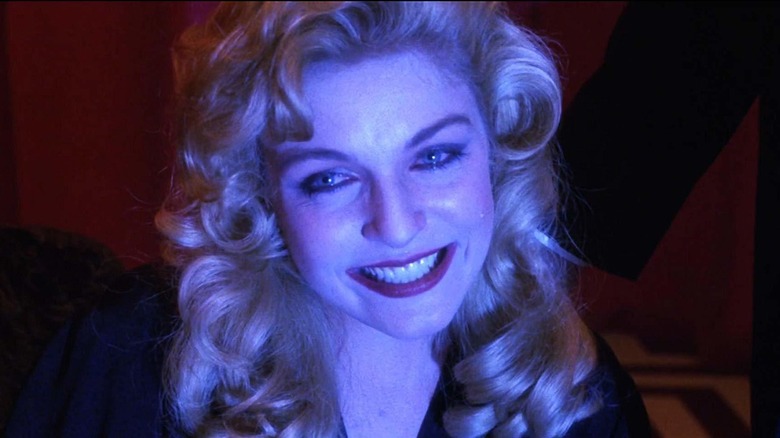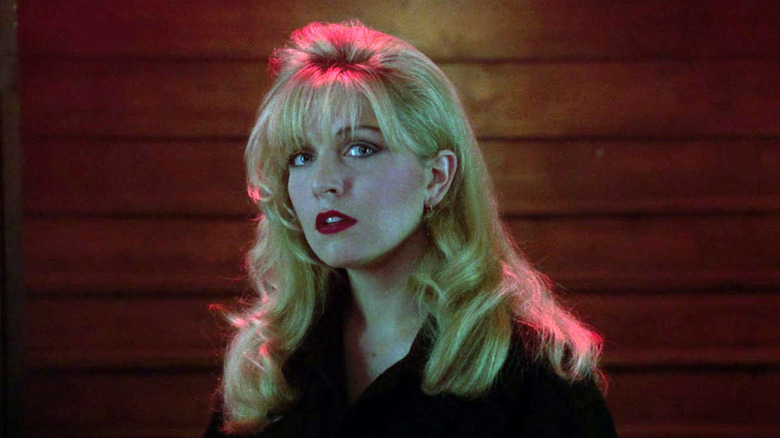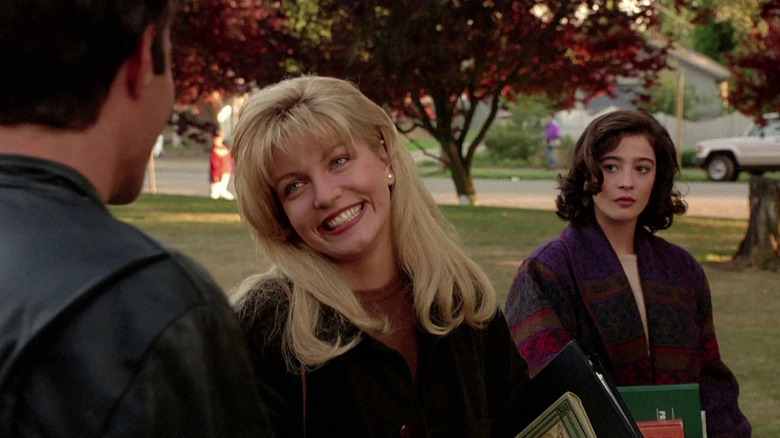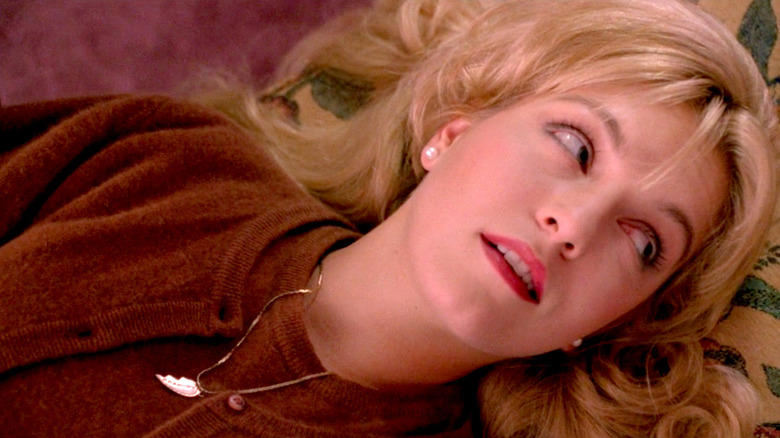Twin Peaks: Fire Walk With Me Was A Feminist Masterpiece Ahead Of Its Time
When David Lynch's "Twin Peaks: Fire Walk With Me" debuted in theaters in 1992, audiences and critics were pretty unimpressed. The ABC series "Twin Peaks," created by Lynch and Mark Frost, was often pretty strange and occasionally a little scary, but it was also very funny. The film is close to humorless, with only a brief comedic scene with Lynch himself in the beginning, and then it's a harrowing nightmare of sexual violence, incest, drug abuse, and murder. "Fire Walk With Me" is a dirge for Laura Palmer (Sheryl Lee), who spent the duration of the series already dead.
"Twin Peaks" asked audiences to figure out who killed Laura Palmer, but "Fire Walk With Me" asked audiences to see who Laura Palmer really was. Instead of learning about her through the memories of those who knew her, the audience is given a chance to know her intimately during her final week alive. It's a brutal experience that follows the downward spiral of a deeply traumatized human being, but it also gives Laura something she never had on the series: agency.
The last days of Laura Palmer
We tend to lose perspective on people after they're dead, especially if they die in a tragic way like Laura's murder. Plenty of assumptions about Laura abound on "Twin Peaks," but it's all a step or two away from the truth. "Twin Peaks: Fire Walk With Me" sticks with Laura through her final days as she attends high school, suffers from nightmares, and tries to numb herself to her secret trauma: Her father, Leland (Ray Wise), has been molesting her for years while possessed by a demonic entity. Even if you completely remove the supernatural elements, Laura's life is a horror story.
Everyone around Laura has some kind of expectation for her, some idea of the homecoming queen in their minds that they've reduced her to. Men see her as an object to conquer, while women are leery of her because of her beauty and the assumption that she's "had it easy." She's hopelessly alone even when she's surrounded by others, and the only person in the entire movie that seems to see into the lost, broken little girl inside of Laura is the Log Lady (Catherine E. Coulson). Unfortunately, they only have one brief interaction, and Laura must constantly battle to keep up with everyone's expectations.
A complicated female protagonist for the ages
Laura Palmer is a challenging protagonist to follow, because she's messy and traumatized and deeply flawed. Early in the film she realizes that her abuser, "Bob," has actually been assaulting her through her father's body, and that's the beginning of her unraveling. She uses cocaine frequently, drinks to excess, and frequents the seedy Bang Bang Bar, where she engages with all manner of potentially demeaning activities. "Fire Walk With Me" never shames her for these actions, however. The audience is expected to sympathize with Laura, who has suffered and hides her pain behind her nice clothes and pretty blonde hair. She wields her smile like a weapon, a defense mechanism for the many predators who view her only as prey. Her overt sexuality is one of the few things she has control over, and she uses it as a means of survival.
In the Bang Bang Bar, Laura asks a man who propositions her for sex work if he wants to "f*** the homecoming queen?" and the ultimate truth of the situation finally shines through: Laura Palmer never had a childhood, the kind of innocent Americana we all worship on television. Instead of worrying about who might ask her to the school dance or studying for her SATs, Laura had to worry about the violent assaults she experienced at night. What's worse, when she tried to tell someone, they didn't believe her.
A story that deserves to be told
I have known Laura Palmer. Not the fictional character, obviously, but young women whose lives mirrored the tragic figure, young women who have been abused by the very people who were supposed to protect them. When these young women acted recklessly in response, doing drugs, having lots of sex, and driving dangerously, they were written off as troubled teens instead of being offered any kind of help. In a review for "Twin Peaks: Fire Walk With Me" from 1992, critic Todd McCarthy says: "Another significant drawback is that Laura Palmer, after all the talk, is not a very interesting or compelling character and long before the climax has become a tiresome teenager." He also laments that the series already answered all the "questions" that "Fire Walk With Me" posits, therefore removing any potential conflict.
"Fire Walk With Me" isn't a mystery, and the core drama comes from empathizing with Laura during her downward spiral. Women are often objectified instead of seen as full human beings, and that doubles when they're beautiful, dead blonde girls. Laura doesn't owe anyone anything more than being a "tiresome teenager," and the film serves to make her a fully formed person and not just the idealized memories left behind. Decades before "Gone Girl" would make audiences fall in love with the idea of an "unlikable female protagonist," Laura was breaking the mold.
The passion of Laura Palmer
The final 20 minutes or so of "Fire Walk With Me" is a harrowing experience, a disturbing and dreamlike look at Laura's undoing. She suffers extensively, tormented by her trauma and by the men in her life that treat her as disposable. Leland's need for control over her grows stronger, and we witness a violent assault and then her murder. It's absolutely brutal, and despite its surreal nature is potentially all too real for victims of sexual assault and incest. Some critics in 1992 were shocked by the brutality of it all, but Laura's suffering is the point. There are critically lauded films about the suffering and deaths of figures like Jesus of Nazareth and Joan of Arc, so why does the suffering change from profound to profane when it's done by a sexually promiscuous teenage girl?
Laura Palmer is a martyr, the patron saint of every victim who has ever been reduced to a stereotype. She's a complicated figure that survives as best she can against the odds, whose torturous travails provide audiences with a brief glimpse into what it's like to be a victimized, traumatized woman. Survivors of abuse and assault can see her as a kindred spirit, and her story being told with unflinching honesty and a lack of judgement is ultimately cathartic. Victims and survivors are not always perfect, nor are they monsters. They're just people who deserved better, and Laura and "Fire Walk With Me" deserved better, too.
If you or anyone you know has been a victim of sexual assault, help is available. Visit the Rape, Abuse & Incest National Network website or contact RAINN's National Helpline at 1-800-656-HOPE (4673).




